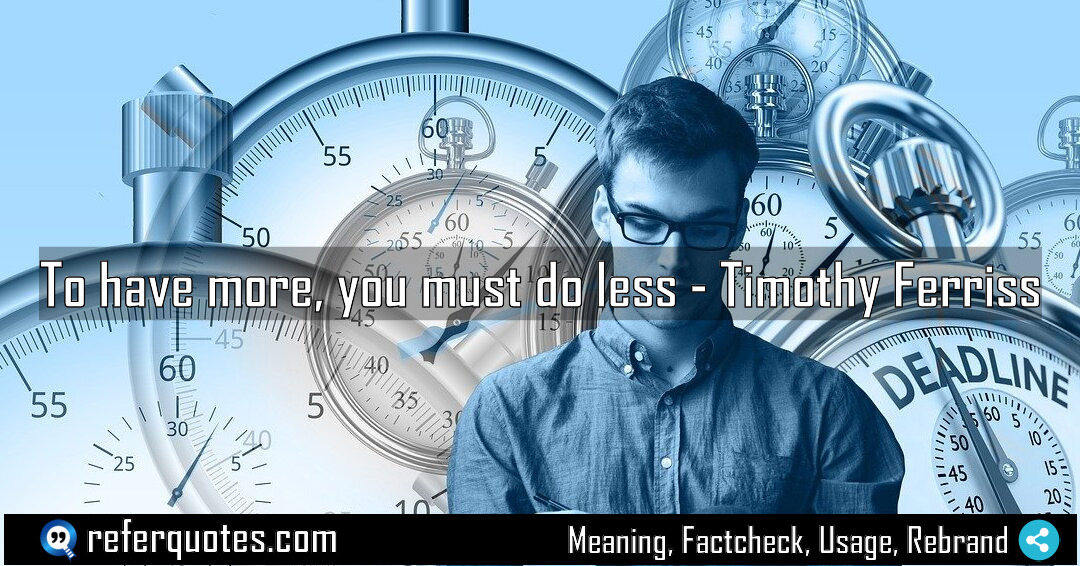
To have more, you must do less sounds like a paradox, but it’s the key to unlocking real productivity. It’s not about laziness; it’s about ruthless focus on what truly moves the needle. This is the core philosophy of working smarter, not harder.
Share Image Quote:
Table of Contents
Meaning
At its heart, this quote is about strategic subtraction. It means achieving greater results, wealth, and freedom not by adding more tasks to your day, but by systematically eliminating the non-essential ones.
Explanation
Look, I’ve seen this play out so many times. We’re all conditioned to believe that being busy is synonymous with being important or productive. But that’s a trap. The real leverage isn’t in doing a hundred things poorly; it’s in doing the one thing that makes the hundred other things irrelevant or easier. It’s about applying the 80/20 rule ruthlessly—identifying the 20% of your activities that generate 80% of your desired outcomes and then having the guts to ignore, delegate, or automate the rest. It’s a complete mindset shift from being a worker to being an architect of your own life and business.
Quote Summary
Reading Level55
Aesthetic Score80
Origin & Factcheck
This concept is the central thesis of Timothy Ferriss’s 2007 book, The 4-Hour Workweek, which was published in the United States. While the exact phrasing “To have more, you must do less” is a powerful summary, the book itself is the full elaboration of this principle. It’s sometimes misattributed to other productivity gurus, but the philosophy is uniquely and definitively Ferriss’s.
Attribution Summary
Author Bio
Timothy Ferriss writes and builds systems that help people work less and achieve more. He broke out with The 4-Hour Workweek and followed with books on body optimization, accelerated learning, and distilled tactics from top performers. He hosts The Tim Ferriss Show, one of the most-downloaded podcasts globally, and has invested in notable technology startups. The Timothy Ferriss book list continues to influence entrepreneurs, creators, and professionals seeking leverage. He studied East Asian Studies at Princeton, founded and sold a supplement company, and actively supports psychedelic science research.
| Official Website | Facebook | X| Instagram | YouTube
Where is this quotation located?
| Quotation | To have more, you must do less |
| Book Details | Publication Year/Date: 2007; ISBN: 9780307353139; Last Edition: Expanded and Updated Edition (2009); Number of Pages: 416. |
| Where is it? | Chapter: Elimination; Approximate page from 2009 edition: 88/416 |
Context
Ferriss wrote this coming from a place of burnout. He was running a sports nutrition company and was working 14-hour days, completely overwhelmed. The book is his blueprint for how he engineered his escape—not by working harder at his business, but by redesigning it to run without his constant, direct involvement. The quote isn’t theoretical; it’s a battle cry from someone who was deep in the trenches of entrepreneurial chaos and found a way out.
Usage Examples
So, how does this look in practice? Let me give you a couple of scenarios.
- For the Burnt-Out Manager: Instead of trying to attend every meeting and cc’d on every email, you identify the one key metric your team is responsible for. You then empower your team to make decisions on everything else, freeing you up to focus solely on strategic direction. You’re doing less micromanaging, but you’re getting more team performance.
- For the Solopreneur: You stop trying to be on every social media platform. You analyze your traffic and sales and realize 90% of your clients come from LinkedIn and your email newsletter. So, you stop posting on Twitter, TikTok, and Instagram. You’re doing less social media work, but you’re getting more qualified leads.
- For Anyone, Really: You batch your errands into one afternoon instead of spreading them throughout the week. You’re doing less driving around, but you’re getting more free, uninterrupted time back.
To whom it appeals?
Share This Quote Image & Motivate
Motivation Score70
Popularity Score80
Shareability Score85
FAQ
Question: Isn’t this just an excuse to be lazy?
Answer: Absolutely not. In fact, it requires more work upfront. It takes serious effort and discipline to analyze your life, identify the inefficiencies, and then make the often-uncomfortable changes to eliminate them. Laziness is doing what’s easy. This is about doing what’s effective.
Question: Does this only apply to business and money?
Answer: Not at all. This is a life philosophy. You can apply it to your health (focusing on the few key exercises and diet changes that yield 80% of the results), your relationships (spending quality time instead of just “being around”), and your personal hobbies. It’s about having more of what you truly value.
Question: What’s the first step to applying this?
Answer: Start with an audit. For one week, track how you spend your time. Then, for every task, ask yourself: “If this is the only thing I accomplish today, will I be happy with my day?” The tasks that don’t pass that test are your prime candidates for elimination, delegation, or automation.
Similar Quotes
To earn more, you must learn more isn’t just a motivational poster. It’s the fundamental operating system for any successful career I’ve ever seen. It’s about transforming your value in…
If you want to earn more, learn more. It’s a simple but powerful formula that links your income directly to your personal growth and the value you provide to others.…
You know, “The more you are grateful for what you have” isn’t just feel-good fluff. It’s a powerful principle that, when you actually apply it, fundamentally shifts your focus and…
If you want to earn more, you must learn more. It’s a simple but powerful truth I’ve seen play out again and again. Your income is directly tied to the…
If you want to live longer, don’t add things. It’s a powerful, counter-intuitive idea. We’re so programmed to add—more supplements, more workouts, more superfoods. But the real secret? It’s in…
